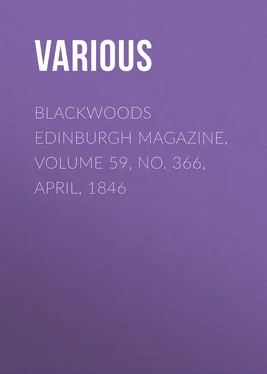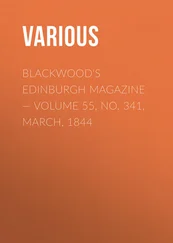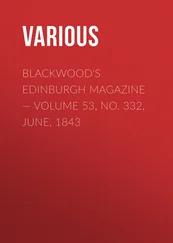Various - Blackwoods Edinburgh Magazine, Volume 59, No. 366, April, 1846
Здесь есть возможность читать онлайн «Various - Blackwoods Edinburgh Magazine, Volume 59, No. 366, April, 1846» — ознакомительный отрывок электронной книги совершенно бесплатно, а после прочтения отрывка купить полную версию. В некоторых случаях можно слушать аудио, скачать через торрент в формате fb2 и присутствует краткое содержание. Жанр: periodic, foreign_edu, Путешествия и география, на английском языке. Описание произведения, (предисловие) а так же отзывы посетителей доступны на портале библиотеки ЛибКат.
- Название:Blackwoods Edinburgh Magazine, Volume 59, No. 366, April, 1846
- Автор:
- Жанр:
- Год:неизвестен
- ISBN:нет данных
- Рейтинг книги:5 / 5. Голосов: 1
-
Избранное:Добавить в избранное
- Отзывы:
-
Ваша оценка:
- 100
- 1
- 2
- 3
- 4
- 5
Blackwoods Edinburgh Magazine, Volume 59, No. 366, April, 1846: краткое содержание, описание и аннотация
Предлагаем к чтению аннотацию, описание, краткое содержание или предисловие (зависит от того, что написал сам автор книги «Blackwoods Edinburgh Magazine, Volume 59, No. 366, April, 1846»). Если вы не нашли необходимую информацию о книге — напишите в комментариях, мы постараемся отыскать её.
Blackwoods Edinburgh Magazine, Volume 59, No. 366, April, 1846 — читать онлайн ознакомительный отрывок
Ниже представлен текст книги, разбитый по страницам. Система сохранения места последней прочитанной страницы, позволяет с удобством читать онлайн бесплатно книгу «Blackwoods Edinburgh Magazine, Volume 59, No. 366, April, 1846», без необходимости каждый раз заново искать на чём Вы остановились. Поставьте закладку, и сможете в любой момент перейти на страницу, на которой закончили чтение.
Интервал:
Закладка:
Our poet, delightful and wise as he generally is, was not wise to match his wit against that of a woman, and an offended beauty. How miserably he comes off in every encounter! He would die, forsooth! once – she would die twice over! There is a hit in his very liver! And as to the survivorship of Chloe, that she suggests, considering their ages, might be very natural – but she doubts if her youth could survive should she die; though she even came to life again, a second time to die, it would be of no use. What could the foolish poet do after that? Nothing – but make up the quarrel in the best way he might. He drops his ears, is a little sulky still – most men are so in these affairs – seldom generous in love. To pretend to be so is only to encroach on woman's sweet and noble prerogative, and to assume her great virtue. No man could keep it up long; he would naturally fall into his virile sulks. So Horace does not at once open his arms that his Lydia may fall into them – but stands hesitatingly, rather foolish, his hands behind him, and puts forward the supposition If – that graceless peace-maker. Lydia, on the contrary – all love, all generosity, is in his arms at once; for he must at the moment bring them forward, whether he will for love or no, or Lydia would fall. It is now she looks into his very eyes, and only playfully, as quizzing his jealousy, reminds him of her Caläis, her star of beauty; thus sweetly reproving and as sweetly forgiving the temper of her Horace – for he is her Horace still – and who can wonder at that? She will bear with all – will live, will die with him. I look, Eusebius, upon this ode as a real consolation to your lovers of an ambiguous and querulous age. Seeing what we are daily becoming, it is a comfort to think that, should such untoward persons make themselves disagreeable to all else of human kind, there will be, nevertheless, to each, one confiding loving creature, to put them in conceit with themselves, and make them, notwithstanding their many perversities, believe that they are unoffending male angels, and die in the bewildering fancy that they are still loveable.
I have little more to say, but that, having been lately in a versifying mood, I have set to rhyme your story of the cook and the lottery ticket; and herein I have avoided that malicious propensity of our numerous tellers of stories, whose only pleasure, as it appears to me, lies in the plunging the heroes and heroines of their tales into inextricable troubles and difficulties, and in continuing them in a state of perplexity beyond the power of human sufferance; and who slur over their unexpected, and generally ill-contrived escape, as a matter of small importance; and with an envy of human happiness, like the fiend who sat scowling on the bliss of Eden, either leave them with sinister intentions, or absolutely drive them out of the Paradise which they have so lately prepared for them.
I have lately been reading a very interesting, well conceived in many respects, and pathetic novel, which, nevertheless, errs in this; and I even think the pathos is injured by the last page, which is too painful for tenderness , which appears the object of the able author. A monumental effigy is but the mockery of all life's doings, which are thus, with their sorrows and their joys, rendered nugatory; and all that we have been reading, and are interested about, is unnecessarily presented to us as dust and ashes. Such is the tale of Mount Sorrel.
Perhaps, too, I might say of this, and of other novels of the same kind, that there is in them an unhealthy egotism; a Byronism of personal feelings; an ingenious invention of labyrinth meandering into the mazes of the mind and of the affections, in which there is always bewilderment, and the escape is rather lucky than foreseen. Such was not the mode adopted heretofore by more vigorous writers, who preferred exhibiting the passions by action, and a few simple touches, which came at once to the heart, without the necessity of unravelling the mismazes of their course. If Achilles had made a long speech in Elysium about his feelings, and attempted to describe them, when his question, if his son excelled in glory, was happily answered, we should have thought less of him for his egotism, and had much less perfect knowledge of the real man's heart and soul. Homer simply tells us, that he walked away, with great strides, greatly rejoicing. I can remember, at this moment, but one tale in which this style of descriptive searchings into the feelings is altogether justifiable – Godwin's " Caleb Williams ;" for there the ever instant terror, varying by the natural activity and ingenuity of the mind, which, upon the one pressing point, feverishly hurries into new, and all possible channels of thought, requires this pervading absolutism. It is the Erynnis of a bygone creed, in a renovated form of persecuting fatalism, brought to sport with the daily incidents and characters of modern life.
I do not wish to be tempted by this course of thought into lengthened criticism; which I should not have touched upon, had I not thought it proper to tell you that I have added a conclusion to your tale. Ever wishing a continuation of the happiness of two human beings, beyond that location in the story, where most spiteful authors leave them, the Church door.
I have been reading, too, over again two of Sir Walter Scott's novels, "Guy Mannering" and "Ivanhoe." How different they are, both in design and execution! The former, in all respects perfect – the latter, in design common-place, and but little enlarged from the old ballad tales of Robin Hood, and histories of the Crusaders; very slovenly in diction, and lengthened out by tiresome repetitions; the same things being told in protracted dialogues which had been previously narrated in the historic course. Then there are very ill-timed interruptions, and wearisome disquisitions, just where they should not be. Yet are there passages of perfect excellence, that prove the master-hand of the author. The novel of "Ivanhoe" seems to resemble some of those plays which, though doubtful, are called Shakspeare's, because it is evident that the master-hand has passed over them, and left touches both of thought and character which justify the position which they enjoy. Rebecca is all in all. The other characters somewhat fail to interest. Ivanhoe himself says but little, and is in fact not much developed. We are disgusted, and unnecessarily, at every turn with Athelstane – there was no occasion for making him this degraded glutton. It seems a clumsy contrivance to break off his marriage with Rowena; and surely the boast of his eating propensities, when he shows himself to his astonished mourners escaped from the death and tomb prepared for him, is unnatural, and throws a contempt and ridicule over the whole scene. Richard and Robin Hood (or Locksley) are not characters of Sir Walter's creation – Richard is, we may suppose, truly portrayed. My friend S – , Eusebius, who, while I was suffering under influenza, read these novels out to me, was offended at a little passage towards the end, where the author steps out of the action of his dramatic piece, to tell you that King Richard did not live to fulfil the benevolent promises he had a line or two before been making; and I entirely agree with S – , and felt the unseemly and untimely intelligence as he read it. This would scarcely be justifiable in a note, but in the body of the work it shocks as a plague-spot on the complexion of health. This practice, too common in novelists, especially the "historical," becoming their own marplots, deserves censure. To borrow from another art, it is like marring a composition, by an uncomfortable line or two running out of the picture, and destroying the completeness. I know not if that fine scene, perhaps the most masterly in Ivanhoe, has ever been painted, where, after the defeat of De Bois-Guilbert, and after that Richard had broken in upon the court, the Grand Master draws off in the repose of stern submission his haughty Knights Templars. The slow procession finely contrasts with the taunting violence of Richard; and what a background is offered to the painter – the variously moved multitude, the rescued Rebecca, and the dead (though scarcely defeated) Templar!
Читать дальшеИнтервал:
Закладка:
Похожие книги на «Blackwoods Edinburgh Magazine, Volume 59, No. 366, April, 1846»
Представляем Вашему вниманию похожие книги на «Blackwoods Edinburgh Magazine, Volume 59, No. 366, April, 1846» списком для выбора. Мы отобрали схожую по названию и смыслу литературу в надежде предоставить читателям больше вариантов отыскать новые, интересные, ещё непрочитанные произведения.
Обсуждение, отзывы о книге «Blackwoods Edinburgh Magazine, Volume 59, No. 366, April, 1846» и просто собственные мнения читателей. Оставьте ваши комментарии, напишите, что Вы думаете о произведении, его смысле или главных героях. Укажите что конкретно понравилось, а что нет, и почему Вы так считаете.












